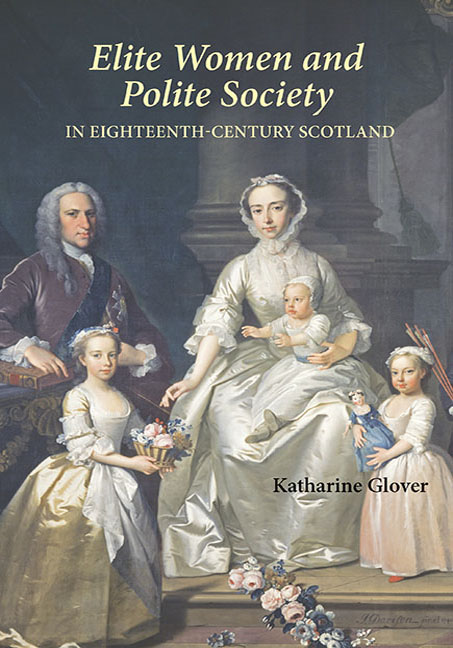Book contents
- Frontmatter
- Contenst
- Dedication
- Acknowledgements
- List of Abbreviations
- Preface
- 1 Elite Women and Eighteenth-Century Scottish Society
- 2 Education and Upbringing
- 3 Reading and Print Culture
- 4 Polite Sociability: Space and Social Practices
- 5 Politics and Influence
- 6 Travel, Tourism and Place
- Conclusion
- Appendix Biographical Backgrounds
- Bibliography
- Index
3 - Reading and Print Culture
Published online by Cambridge University Press: 08 April 2017
- Frontmatter
- Contenst
- Dedication
- Acknowledgements
- List of Abbreviations
- Preface
- 1 Elite Women and Eighteenth-Century Scottish Society
- 2 Education and Upbringing
- 3 Reading and Print Culture
- 4 Polite Sociability: Space and Social Practices
- 5 Politics and Influence
- 6 Travel, Tourism and Place
- Conclusion
- Appendix Biographical Backgrounds
- Bibliography
- Index
Summary
From the vantage point of her old age in the 1790s, Elizabeth Mure wrote of early eighteenth-century Scotland that ‘The weman's knowlege was gain'd only by conversing with the men not by reading themselves, and not picked up at their own hand, as they had few books to read that they could understand. Whoever had read Pope, Addison & Swift, with some ill wrot history, was then thought a lairnd Lady, which Character was by no means agreeable.’ Women, she suggested, had been both practically and prescriptively unable to access information through print, and even a slight acquaintance with the world of letters was enough to label a woman as excessively learned. Mure's dismissal of the literary opportunities open to women in the early years of the century is significant less as an accurate reflection of that period than as an expression of the prevalent belief by the time she was writing that this situation had changed dramatically and with significant repercussions for elite women's experience. By the mid-eighteenth century, the association of elite women with literary culture had become a commonplace which, according to Vivien Jones, has been ‘rediscovered and confirmed by twentieth-century feminist literary scholarship’. From an historical perspective, Amanda Vickery similarly concluded that the mid-to-late eighteenth-century gentlewoman ‘enjoyed unprecedented access to the public world of print’, whilst women's growing involvement in literary culture as both writers and readers has been described by a historian of reading as ‘one of the most striking phenomena of the eighteenth century’. Although it must be cautioned that access to reading was not automatically liberating, and that women's access to print remained subject to far more limitations than that of their male counterparts, the important place of reading and literary culture in the lives of the women under consideration in this study is unmistakeable.
Reading was an activity fundamental to the pursuit of politeness. In terms of engaging with ideas, exercising reason and the potential for improvement in taste and knowledge that it posed, reading – at least the ‘right’ kind of reading – was an intrinsically polite activity.
- Type
- Chapter
- Information
- Publisher: Boydell & BrewerPrint publication year: 2011



